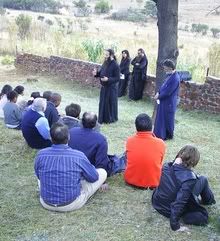 Fr Pantelejmon Jovanovic (in picture) spoke to the Orthodox youth on the monastic life, and Advocate George Bizos, the human-rights lawyer, spoke on the meaning of the day.
Fr Pantelejmon Jovanovic (in picture) spoke to the Orthodox youth on the monastic life, and Advocate George Bizos, the human-rights lawyer, spoke on the meaning of the day.If anyone is interested in the meaning of the day, there are two books I recommend. One is fiction, A dry white season by Andre Brink, which really does tell it like it was. Names and events may havbe been changed, but these were indeed the kind of things that happened. The other book is The rocky rioter teargas show by Pat Hopkins and Helen Grange, which is illustrated by photographs and documents not available at the time, including secret cabinet documents giving explicit approval to more deaths through police action.
George Bizos spoke on the damage caused by Bantu Education, but in 1976 Andries Treurnicht, the Minister of Bantu Education, and his Deputy, Ferdi Hartzenberg insisted that in black schools half the subjects in high schools should be taught through the medium of English, and half through the medium of Afrikaans. The irony of this was that 70 years earlier Afrikaners, in the aftermath of the Anglo-Boer War, had suffered something very similar under British rule, when Dutch was forbidden as a medium of instruction, and all teaching had to be in English. They learnt the lesson that the language of the conqueror in the mouth of the conquered is the language of slaves.
But Paolo Freire, the Brazilian educationist, points out in his book Pedagogy of the oppressed that the oppressed internalises the image of the oppressor as the image of what it means to be truly human. So true humanity becomes linked with the power to oppress others. And this clearly happened in the case of Andries Treurnicht and Ferdi Hartzenberg. They were the avatars of Alfred Lord Milner, who had almost single-handedly started the Second Anglo-Boer War in 1899, and oppressed the Afrikaners after the war.
The disease of Bantu Education was harder to eradicate, however. When it was introduced in 1954, it was part of the ideology of Christian National Education, which, as its Christian liberal opponents pointed out, was neither Christian, nor national, nor education. In 1942, when South Africa was at war with Nazi Germany, B.J. Vorster, who was prime minister in 1976, was reported to have said
We stand for Christian Nationalism, which is an ally of National Socialism. You may call the anti-democratic system dictatorship if you like. In Italy it is called Fascism, in Germany National Socialism, and in South Africa Christian Nationalism."
One thing that interested me was that when George Bizos spoke of the ravages of Bantu Education, and Fr Pantelejmon spoke of growing up as a young person in a communist country, they spoke of very similar experiences, though they themselves did not perhaps realise how similar they were. The generation of young people Fr Pantelejmon spoke to had indeed not experienced much of the repression that Fr Pantelejmon spoke of, but the generation of Soweto 1976 certainly had.
To the youth of today all this is ancient history, and history is one of the boring school subjects that is being downplayed in modern education, with its emphasis on science and technology, which our youth must learn if we are to compete in the dog-eat-dog competition of neoliberal economics. Humanities, which do not have quantifiable economic value, are downplayed. We must gain riches instead of soul, and the all-pervasive ideology of free-marketism could well be responsible for the complaint of many of the Class of '76, aired in radio talk shows and the like, that the youth of today are shallow and materialistic.
Where does this come from? Well, one possibility is that the current crop of ANC leaders, including some of the generation of 1976, spent a good part of their exile in Thatcher's Britain, and this may go quite a long way towards explaining the ANC's Thatcherist policies today.
But I think the image of the youth of today projected by the radio talk shows and the like is not a complete one. The people they interview are mostly "Model Cs", who often speak with Woozer (ie WUESA - White Urban English-Speaking South African) accents. "Model C" was the last attempt of the dying National Party regime, in 1992, to perpetuate Christian National Education in white schools, or at least white Afrikaans schools, by privatising them. "Model Cs" are black pupils who have attended such schools (still referred to as "Model C" schools, in spite of their having been in existence for less than three years).
The Model Cs are the ones most advertising is aimed at, and the ones most likely to make it in the broadcast media. But the young people at the Orthodox youth gathering do not fit the Model C stereotype. Their concerns may be different from those of the Class of '76, but they give me hope for the future.
Other views, and other ways people spent Youth Day
The Front Line: Youth Day, 3 Decades of Struggle.
the moon's favors: Poem for Youth Day
the imperfect poet: More irrelevant conversation
Morphological Confetti: Youth Day: 30th Anniversary
Reluctant Nomad: The day that changed South Africa for ever
Technorati tags: liberation struggle, Youth Day
2 comments:
I stumbled upon your site through the Holy Archangels Monastery blog.
Thank you for sharing this and the book recommendations. I am only mildly knowledgable about the events of '76 in South Africa. And my knowledge only comes through popular culture or what the media deems important enough to tell me.
Deb
Our South African monks are from Black River monastery, and they will be returning there for a couple of months in July.
We said they must bring another four monks wioth them to populate St Nektarius with monks!
Post a Comment